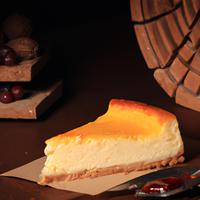
1 serving (125 grams) contains 350 calories, 6.0 grams of protein, 23.0 grams of fat, and 30.0 grams of carbohydrates.

Log this food in SnapCalorie

Nutrition Information
Calories |
700 | ||
|---|---|---|---|
% Daily Value* |
|||
| Total Fat | 46 g | 58% | |
| Saturated Fat | 28 g | 140% | |
| Polyunsaturated Fat | 0 g | ||
| Cholesterol | 160 mg | 53% | |
| Sodium | 500 mg | 21% | |
| Total Carbohydrates | 60 g | 21% | |
| Dietary Fiber | 1 g | 3% | |
| Sugars | 40 g | ||
| protein | 12 g | 24% | |
| Vitamin D | 40 mcg | 200% | |
| Calcium | 200 mg | 15% | |
| Iron | 1.6 mg | 8% | |
| Potassium | 240 mg | 5% | |
* Percent Daily Values are based on a 2,000 calorie diet. Your daily values may be higher or lower depending on your calorie needs.
Food Attributes
Source of Calories
About Chese cake
Cheesecake is a rich, indulgent dessert made primarily from cream cheese, sugar, eggs, and a base such as graham cracker crust or pastry. Originating from Ancient Greece and popularized in North America, this beloved dish has diversified into culinary traditions worldwide, with variations including fruit toppings, chocolate, and cultural adaptations. Cream cheese provides a creamy texture and savory undertone, while added sugar and butter contribute to its characteristic sweetness and decadence. Cheesecake is high in calories, saturated fats, and sugar, making it a treat best enjoyed in moderation. On the healthy side, it provides protein from the eggs and dairy as well as essential minerals like calcium. Some recipes use alternative sweeteners or low-fat ingredients to reduce calorie content, though traditional versions remain a rich indulgence. Perfect for special occasions, cheesecake offers a balance of taste and texture that continues to make it a favorite dessert across cultures.



